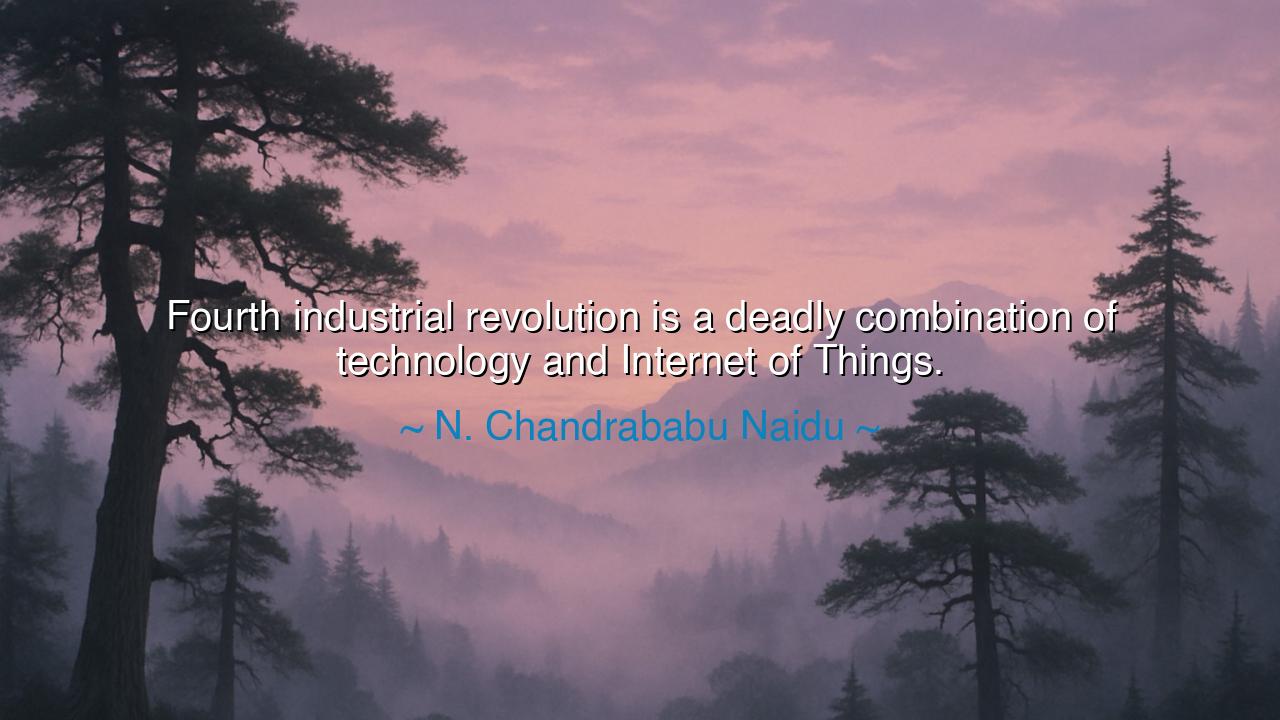
Fourth industrial revolution is a deadly combination of
Fourth industrial revolution is a deadly combination of technology and Internet of Things.






Hear now the words of N. Chandrababu Naidu: “Fourth industrial revolution is a deadly combination of technology and Internet of Things.” In this declaration, he speaks of an age where the old boundaries of human effort and machine capacity dissolve into a new force of creation and disruption. The Fourth Industrial Revolution is not a mere continuation of past ages of steam, electricity, or computers—it is a weaving together of all that came before into a living network, where the Internet of Things (IoT) binds the physical and the digital world. It is a deadly combination, not in the sense of destruction, but in its unmatched power to transform every aspect of life.
The origin of this thought lies in the progression of human ingenuity. The First Industrial Revolution gave us steam and mechanization, harnessing fire and iron to free human labor. The Second brought electricity, enabling mass production and global connectivity. The Third, powered by computers and digital systems, turned information into the new currency of power. But the Fourth surpasses them all: it is the fusion of technologies, where sensors, machines, data, and artificial intelligence form one vast ecosystem. Chandrababu Naidu, a leader and reformer in India’s technological transformation, recognized this tide and gave voice to its magnitude.
Consider a story from our present age: the rise of smart cities. In Singapore, sensors track traffic, energy use, and water distribution in real time, allowing the city to breathe as though it were a living organism. Waste is reduced, roads unclogged, and resources distributed with precision. This is the Internet of Things in action—invisible threads connecting countless devices, creating harmony where once there was chaos. Yet, as Naidu reminds us, the same forces can overwhelm societies unprepared, for power without wisdom can lead to surveillance, inequality, and exploitation.
In ancient times, when Prometheus stole fire for mankind, the gift was both a blessing and a burden. Fire could warm the hearth or burn villages to ash. So it is with the technological fire of IoT. It can heal, guide, and uplift, but it can also enslave, control, and divide. The “deadly combination” is thus a warning: mankind must wield these tools with discernment, lest the very networks meant to serve us become chains that bind us.
The meaning of this revolution extends beyond machines; it reshapes human identity itself. A farmer in rural India now checks soil moisture through sensors linked to satellites. A surgeon in one land operates on a patient in another through robotic arms connected by the internet. A child’s toy, seemingly simple, listens, learns, and sends data across continents. The fusion of body, environment, and machine heralds a destiny where humanity cannot be thought of apart from its technology.
The lesson, then, is twofold. First, embrace the opportunities of this revolution: learn, adapt, and innovate. Do not fear the network of things, but prepare to shape it. Second, guard against its dangers. Demand ethics, privacy, and fairness in the age of data. Teach children not only how to use devices, but also how to rule over them with wisdom. The greatest mistake of this age would be to surrender our spirit to the tools we created.
Practical actions lie before us: invest in education that fuses science with humanity, support policies that protect dignity in the digital world, and build communities that use IoT to uplift the poor, heal the sick, and protect the Earth. Let every household learn not just to consume technology, but to question it, guide it, and use it for the greater good.
Thus, let these words echo to future generations: the Fourth Industrial Revolution is upon us, mighty and swift. It is indeed a deadly combination of technology and IoT, but deadly only to those unprepared. To the wise, it is not a curse, but a new dawn. If we meet it with courage and discernment, it shall not enslave us, but instead elevate humanity to heights once thought unreachable.






AAdministratorAdministrator
Welcome, honored guests. Please leave a comment, we will respond soon